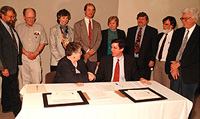![[Currents header graphic]](/homeart/currents_header.gif)
![[Currents header graphic]](/homeart/currents_header.gif)
April 19, 1999
By Tim Stephens
UCSC and the California Academy of Sciences (CAS) have agreed to combine strengths in pursuit of their common interests in biological research and public education. Chancellor Greenwood and CAS Executive Director Patrick Kociolek signed a memorandum of understanding formalizing the ties between the two institutions in a ceremony last week at the UCSC Arboretum.

|
|
Chancellor Greenwood and CAS Executive Director Patrick Kociolek shake hands over an agreement formalizing ties between their two institutions. (larger photo)
|
"The California Academy of Sciences has resources and expertise that complement those of UCSC, particularly in areas related to the increasingly important issue of understanding the value of biodiversity," Greenwood said.
The extensive collections of natural history specimens at CAS are among the world's largest and provide essential tools for comparative studies in biodiversity. Experts in the academy's eight scientific departments include leading authorities (known as systematists) on the classification of different types of organisms.
"The academy has biologists and systematists whose work dovetails nicely with research at UCSC in biology, chemistry, and marine science, and we hope the memorandum of understanding will foster cooperative interactions in these areas," Kociolek said.
Kociolek said he also sees natural links between CAS and UCSC's Education Department, Science Communication Program, and the Arboretum, with its valuable collection of plants from the Southern Hemisphere.
"The campus has a wonderful resource in the Arboretum, and we have a team of botanists who could help develop its potential for research and education," Kociolek said.
The memorandum provides, among other things, a framework for CAS staff to serve on advisory committees for UCSC graduate students and to teach courses at the campus. It also encourages the faculties of the two institutions to collaborate in both research and education programs. UCSC undergraduate and graduate students will have opportunities for internships in CAS programs in the areas of research, illustration, and journalism.
John Pearse, professor emeritus of biology at UCSC and president of the CAS, said he looks forward to strengthening both institutions through these kinds of interactions. The April 12 signing ceremony coincided with a meeting of the CAS fellows from the Monterey Bay region.
The academy is governed by a board of trustees elected by the CAS fellows, who are prominent scientists at institutions throughout California. Adrienne Zihlman, professor of anthropology at UCSC, is vice president of the CAS, and 11 other UCSC faculty and emeriti, in addition to Pearse and Zihlman, are CAS fellows.
Donald Potts, professor of biology and a CAS fellow, said collaborations between the two institutions can play an important role in developing the environmental sciences in central California and beyond. Potts is particularly interested in partnerships to study marine biodiversity along the Central Coast of California and the coral reefs of the western Pacific.
"We have the richest temperate marine ecosystem in the world here on the California coast, from the Cordell Bank, Gulf of the Farallones, and Monterey Bay National Marine Sanctuaries south to the Channel Islands National Marine Sanctuary," Potts said. "Yet our understanding of the ecological properties of different species is extremely limited, and in many cases we don't even know what species there are," he noted.
The CAS, based in San Francisco's Golden Gate Park, is a private nonprofit educational and research institution. Founded in 1853, it is the oldest scientific institution in the West.